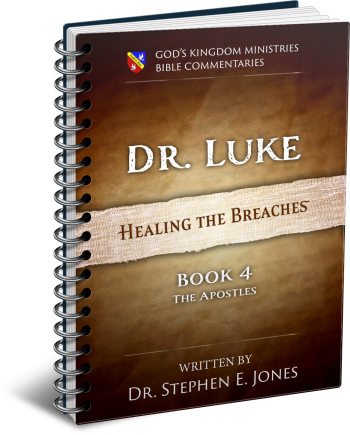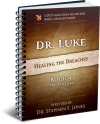Latest Posts
View the latest posts in an easy-to-read list format, with filtering options.

This book covers Luke 10-11, where Jesus sent out the Seventy with a specific message of the Kingdom.
Category - Bible Commentaries

This is the last portion of the Lord’s prayer in the shortened version of Luke’s account. The KJV adds, “but deliver us from evil,” in order to complete the thought from Matt. 6:13. Old Greek manuscripts differ in certain details. The KJV follows one manuscript, the NASB another. To me, the matter is settled by Ivan Panin’s Numeric New Testament, which agrees with the NASB.
The numeric patterns built into the actual inspired text show that some ancient copyist decided that Luke should have completed the thought, so he added what Matthew had written. But this only destroyed the numeric patterns in the text itself. As Panin shows, man’s additions are exposed by the mathematical patterns.
Even so, by comparing Matthew and Luke, we do obtain a more complete picture, as one writer supplements the other to obtain a more complete account.
Luke was content to leave it as a prayer to avoid temptation, or trial. Matthew showed the alternative, or the solution to the possible problem. So in a way, we might understand the full thought to mean, “Do not lead us into temptation without also delivering us from the evil one, the tempter.”
This petition would be irrelevant unless the potential existed for being led into temptation or trial. So we see Jesus Himself being led by the Spirit into the wilderness to be tempted of the devil (Luke 4:1, 2). Heb. 4:15 says of this,
15 For we do not have a high priest who cannot sympathize with our weaknesses, but one who has been tempted in all things as we are, yet without sin.
Jesus’ forty days in the wilderness was modeled after Israel’s forty years in the wilderness. Moses explained Israel’s temptation in Deut. 8:2,
2 And you shall remember all the way which the Lord your God has led you in the wilderness these forty years, that He might humble you, testing you, to know what was in your heart, whether you would keep His commandments or not.
God did the leading, in order that Israel might know its own heart. Israel failed ten tests in the first year and a half, climaxing with the report of the twelve spies. Num. 14:22, 23 says,
22 Surely all the men who have seen My glory and My signs, which I performed in Egypt and in the wilderness, yet have put Me to the test, these ten times and have not listened to My voice, 23 shall by no means see the land which I swore to their fathers, nor shall any of those who spurned Me see it.
God knew their hearts, of course. The problem was that the people themselves had greater confidence in their hearts than they ought to have had. When they confidently said in Exodus 19:8, “All that the Lord has spoken we will do!” they were terribly naïve.
So Moses told them (and us) that the purpose of temptation (trial, testing) is to give us a reality check that will remove our self-righteousness and keep us humble. The proud are those who do not know their hearts. The humble are those who do. There are still others, of course, who must search hard for reasons to be humble. They do not really believe they have reason to be humble, but they know from Scripture that humility is a virtue, so they try hard to simulate humility.
It is clear that although God does not directly tempt any man (James 1:13), He does lead people into places where they may be tempted by the devil (as in Jesus’ case). God still takes the ultimate credit for this, but there He has chosen to hire an agent to do the job. James makes an interesting statement as well in James 1:14,
14 but each one is tempted when he is carried away and enticed by his own lust.
In other words, it is our own heart that makes us susceptible to temptation. This fully agrees with Moses in Deut. 8:2, when he says the purpose of such temptation is to know one’s own heart and that the goal is to produce humility.
The implication is that everyone (that is, the old Adamic fleshly man) fails the heart exams. The paradox is that we really have no chance of overcoming the condition of our heart, apart from the Holy Spirit’s work to change our nature from the inside.
So why are we to pray, “Lead us NOT into temptation”? We know that He will do so, especially if we are His children. God brings all of His children into discipline and times of testing in order to bring them to spiritual maturity. His tests bring inevitable failure, but over time those tests lead to overcoming. We see this in Matthew’s account, which brings deliverance in the face of trial: “but deliver us from evil.”
This is what turns tears into joy. While we should never lose that sense of humility, we certainly are called to move from immaturity to maturity, from rebelliousness to obedience, and from failure to success.
If we are yet mired in the quicksand of failure, we most need the second part of the prayer, “deliver us from evil.” However, the path to victory and success is not easy to find, primarily because people still look to the old flesh man to be transformed from a failure to an overcomer. That old man is incapable of success. He can be buffeted and beaten into subjection, but he will never be willingly righteous. He can be forced to behave righteously, but he will always be—by nature—a man of sin.
The path to deliverance is seen in the truth of Sonship. When the Holy Spirit comes upon us to beget Christ in us, that New Creation Man is the only one capable of righteousness. In fact, he is incapable of sin, as both Paul and John testify. Such believers have two “men” within, one fleshly and one spiritual. The one cannot be righteous, and the other cannot fulfill the works of the flesh. We identify with whichever “man” in which we have placed our confidence.
If we believe that God’s deliverance comes by means of transforming the old man into a righteous man, then we will continually beat him into subjection until he confesses Christ in every word and deed. That path, however, leads only to futility and despair, for this method requires that we continue to identify with the flesh and have confidence in its ability to be changed, if only it can be disciplined sufficiently.
But the man of sin has already been condemned to death. Nothing can reverse this sentence. The old man must die, and a New Creation Man must arise in its place. We must shift our focus and re-identify ourselves with the New Creation Man. This usually means forming a new habit of thinking, where we continually register our new identity in the courts of heaven until we actually believe our declarations. It may be helpful to stand in front of the mirror, look yourself in the eye, and declare before God, “I am the New Creation Man; the flesh is not me; I am dead to the flesh and alive in Christ.” Such glorious statements are often difficult to believe at first, so this may have to be repeated numerous time until it becomes a revelation and reality in your experience.
The problem is not in the prayer, “deliver us from evil.” The problem is that we think the old man is supposed to be delivered (saved). As long as we believe this, we will continue to identify with the old man while beating him daily to get him delivered. This is the sure path to despair. Only when we understand the path of Sonship can we find rest, knowing that victory is assured.
The eloquent ending in Matthew 6:13, which we all love and have memorized, is put in brackets in the NASB: “[For Thine is the kingdom, and the power, and the glory forever. Amen.]” In other words, they question its validity, because it is not in all of the old Greek manuscripts. Ivan Panin’s Numeric New Testament omits it entirely. The Wycliffe Bible Commentary says,
“The doxology in 6:13b is a liturgical interpolation from 1 Chron. 29:11.”
An interpolation is defined as “an insertion, or change in a text by introducing new or false material.” 1 Chronicles 29:10, 11 is the first part of David’s prayer,
10 So David blessed the Lord in the sight of all the assembly; and David said, “Blessed art Thou, O Lord God of Israel our father, forever and ever. 11 Thine, O Lord, is the greatness and the power and the glory and the victory and the majesty, indeed everything that is in the heavens and the earth; Thine is the dominion, O Lord, and Thou dost exalt Thyself as head over all.”
The Jerome Bible Commentary (Catholic source) says of this doxology,
“A doxology, ‘For thine is the kingdom and the power and the glory forever and ever, Amen’ is found in many Gk mss [i.e., Greek manuscripts]. The presence of a similar doxology in the Didache (8:2), a work written before AD 100, suggests that the doxology is a very early expansion. It was normal in Judaism to conclude prayers with a formal doxology, and the early Christian communities often followed the Jewish practice. The doxology, however, is not found in the most reliable mss.”
In other words, they attribute this doxology to someone prior to the year 100, who added it (perhaps from David’s prayer) in order to make it more like a Jewish traditional prayer. The Didache, or Teachings of the Twelve Apostles, is often dated around 65 A.D. It is the oldest non-canonical writing of the early church. Chapter 8 reads this way:
Chapter 8. Fasting and Prayer (the Lord's Prayer). But let not your fasts be with the hypocrites, for they fast on the second and fifth day of the week. Rather, fast on the fourth day and the Preparation (Friday). Do not pray like the hypocrites, but rather as the Lord commanded in His Gospel, like this:
Our Father who art in heaven, hallowed be Thy name. Thy kingdom come. Thy will be done on earth, as it is in heaven. Give us today our daily (needful) bread, and forgive us our debt as we also forgive our debtors. And bring us not into temptation, but deliver us from the evil one (or, evil); for Thine is the power and the glory for ever.
Pray this three times each day.
http://www.earlychristianwritings.com/text/didache-roberts.html
Apparently, this full prayer became so widespread that many people added it to their copies of Matthew, and it eventually appeared to be part of the original words of Jesus. Of course, I like the full version myself, and there is certainly nothing wrong with praying in this way. But we ought to understand too that it was not part of the original.